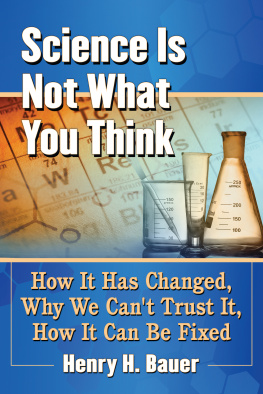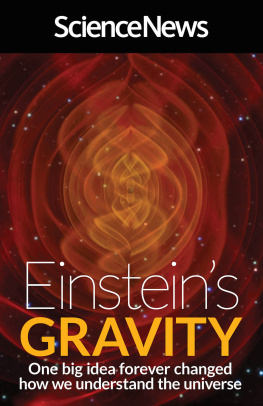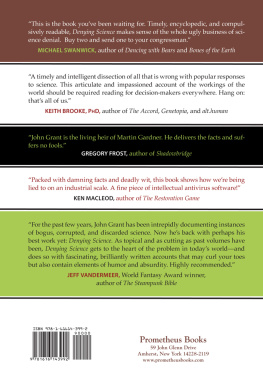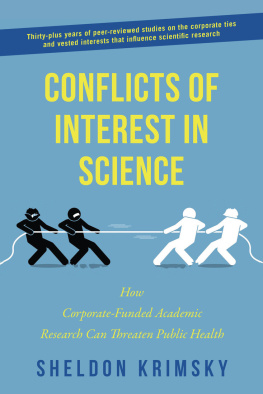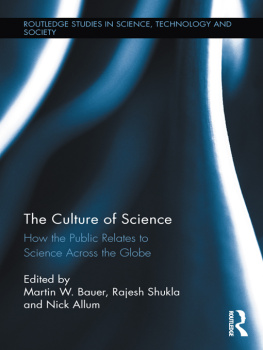
Also by HENRY H. BAUER
AND FROM MCFARLAND
Dogmatism in Science and Medicine:
How Dominant Theories Monopolize Research and Stifle the Search for Truth (2012)
The Origin, Persistence and Failings of HIV/AIDS Theory (2007)
Science Is Not What You Think
How It Has Changed, Why We Cant Trust It, How It Can Be Fixed
Henry H. Bauer

McFarland & Company, Inc., Publishers
Jefferson, North Carolina
LIBRARY OF CONGRESS CATALOGUING DATA ARE AVAILABLE
BRITISH LIBRARY CATALOGUING DATA ARE AVAILABLE
e-ISBN: 978-1-4766-2823-3
2017 Henry H. Bauer. All rights reserved
No part of this book may be reproduced or transmitted in any form or by any means, electronic or mechanical, including photocopying or recording, or by any information storage and retrieval system, without permission in writing from the publisher.
Front cover image 2017 fotohunter/iStock
McFarland & Company, Inc., Publishers
Box 611, Jefferson, North Carolina 28640
www.mcfarlandpub.com
List of Figures
Preface
Science is of great, wide-ranging importance in contemporary society. It represents the effective touchstone of reliable knowledge.
Media and policy makers seem to take for granted that a contemporary consensus about scientific matters can safely be treated as practical truth. Science is taken to be what mainstream sources say it is: what is disseminated as science by official agencies, by spokespeople for professional scientific organizations, or by individual scientific VIPs. For a significant number of people, science has effectively replaced religion or socio-political ideology for certifying what is true.
However, history teaches unequivocally that any contemporary scientific consensus is likely to be superseded at some later time. Indeed, the very progress of science has depended on modifying, or even replacing entirely, some previously accepted views that had been questioned earlier (if at all) only by people or groups widely ignored or dismissed as unqualified, incompetent, or downright crackpot.
That historical fact of continual modification and replacement of scientific beliefs is not widely enough known, which may be one reason why contemporary scientific claims and theories are sometimes accepted more readily than could be justified objectively by the plain undisputed facts. Further reasons for such ready acceptance include that a number of widely held beliefs about the nature of science are to some degree mistaken, among them:
That science is perpetually skeptical and doesnt form a belief until the evidence demands it.
That the scientific method ensures that science gets it right the first time because theories are accepted only after the evidence has shown them to be right.
That science is self-correcting because it changes its mind whenever the evidence demands it. (Note that this is incompatible with the first two points: self-correction is only needed if science doesnt get things right the first time.)
That peer review safeguards the objectivity of science.
But if these really are misconceptions on such important points, how could they have remained widespread? After all, science has been part of human activity and society for a long time, during which scientific activity and its products have been scrutinized quite intensively.
A ready answer to this apparent conundrum, and an important insight in its own right, is that these were not always outright misconceptions. For a couple of centuries and up to about the middle of the 20th century, these were not obviously unreasonable views. However, scientific activity underwent a sea change during and following the Second World War, and even specialist academic understanding of the nature and ramifications of science has not caught up with the significance of what has happened during this last half a century or so. Even less has the popular conventional wisdom adapted to the new realities of scientific activity, most significantly the fact that conflicts of interest and outside pressures on scientific work have been accompanied by a decline in integrity and trustworthiness.
Historians and other observers and pundits agree that what is usually called modern science had its origins in the so-called Scientific Revolution, generally ascribed to about the 17th century. A crucial ingredient was determined empiricism, in other words basing explanations, theories, understanding, firmly on the available evidencethis by contrast to accepting what religious or political authorities claimed. Describing the scientific method as letting evidence determine theory, as testing hypotheses against the evidence, is a quite reasonable description of what was going on when science became modern and went on to its staggering achievements of the last several centuries.
The determination to practice empiricism was by no means restricted to matters of natural science, it was also evident in the wider society. Christianity (or Roman Catholicism) experienced the Reformation, with some priests and even some laity claiming the right to interpret holy scriptures themselves instead of accepting without question the interpretations handed down by religious authorities. The Enlightenment, a period covering the latter part of the 17th century and the succeeding 18th century, came somewhat later than the Scientific Revolution, perhaps stimulated by the Scientific Revolution or occasioned by the same social forces. One notable aspect of the Enlightenment was the French Revolution, whose ambition was to replace the traditional authoritarian sociopolitical order by arrangements informed by the Enlightenment ideals of freedom and equality for all, founded upon human reasonrational thought based on empirical fact.
A crucial practical ingredient in the modernizing of science was the establishing of scientific associations or societies in which claims were discussed, critiqued, accepted or modified or rejectedin other words, interactions that would nowadays be described as peer review. This did indeed make for more objectivity in the early experience of modern science. In the present day, by contrast, peer review is so beset by personal and structural or institutional conflicts of interest that it no longer serves as a reliable safeguard of objectivity.
Just as the Scientific Revolution of the 17th century did not occur in isolation from the rest of society, being associated with the Reformation and the Enlightenment, so too the sea change in scientific activity since World War II has not occurred in isolation. Just as the traditional views about science no longer apply, so too one sees nowadays in several other human activities quite common instances of behavior that would have been regarded as out of bounds, beyond the pale, only half a century or so ago. In sport, for example, intercollegiate as well as professional, things that would have been regarded fifty years ago as so improper as to verge on criminal are presently accepted, albeit perhaps regretfully, as just the way things are, so entrenched as to offer little or no prospect for change: think of doping in professional sports, say, or college admissions of academically unqualified student athletes.
Misconceptions about the general nature of todays science are abetted not only by ignorance of the actual history of science and of the drastic changes in it and in society since World War II. There is also a considerable lack of knowledge about the actual specifics of the vast range of what contemporary science concerns itself with. In almost every research project, uncertainties abound and researchers differ over interpretations and the significance or validity of specific claims, but the public is generally unaware of these uncertainties. The media usually reflect only the mainstream consensus, thereby fostering a monolithic picture of contemporary science, as though the currently predominant views were universally held; whereas in reality the experts may be far from unanimous. What everyone knows is in fact disputed by some number of well informed and qualified researchers on a perhaps surprising range of issues: whether Alzheimers disease is really caused by amyloid plaques; how specific and effective anti-depressant drugs are; from where came the humans who first settled in the Americas; whether the extinction of the dinosaurs was really caused by an asteroid colliding with the Earth; and more. On those matters, the popular media treat the current consensus as established truth and that becomes what is generally believed.
Next page
